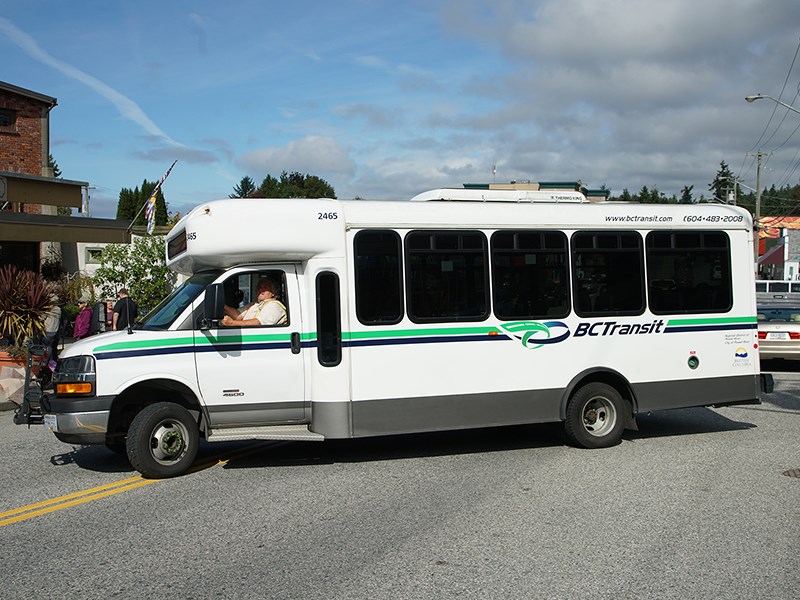Powell River’s handyDART bus system was a major topic of discussion at a recent City of Powell River committee of the whole meeting, with two delegations and one letter requesting expansion of service.
At the committee meeting on Tuesday, September 17, city councillors heard presentations from David and Margaret Hodgins, plus Laura Kissick, and received a letter from Kathryn Hjorleifson and Chuck Emery about the bus service.
According to BC Transit, handyDART is an accessible, door-to-door shared transit service for people with permanent or temporary disabilities that prevent them from using fixed-route transit without assistance from another person. handyDART vehicles pick customers up at their accessible door and drop them off at the accessible door of their destination.
Margaret Hodgins said she was appearing before the committee to advocate for anybody with a mobility impairment. She said her 47-year-old son suffered a life-changing stroke a year ago and is now living in Willingdon Creek Village confined to a wheelchair. She said she and her husband did not give much thought to the services until they were forced to live the life of a person with disabilities.
“This has altered everybody’s lives,” she said. “We are trying to advocate for those who can’t speak or act on their own behalf to improve their ability to get out and about within the community.”
David Hodgins said he had been told there were three buses in Powell River and one is held back as a spare in case one of them fails.
He said with the current service, on Mondays, only one handyDART bus operates from 8 am to 4 pm, on Tuesdays through Fridays, two buses run, from 8 am to 5 pm, and on Saturdays, one bus runs. There are no bus operations on Sundays or statutory holidays and there is no handyDART for special events, according to David.
“Clients are not able to attend any functions that happen after 5 pm,” he said.
Additionally, handyDART is not always available and David said he has had to reschedule doctor’s appointments around handyDART availability.
There is no cab service that operates a wheelchair vehicle, so it’s always beg, borrow or steal and hope someone will give you a van for a medical appointment, said David. It affects not only the client, but the family, also, he added.
“I’d like to see an improvement,” said David.
Margaret said they were speaking out on behalf of their son but also for everybody else who has mobility impairments that make it virtually impossible for them to get out in the city.
Committee chair Jim Palm said the councillors hear the Hodgins’ frustration and wanted to express sympathy for their son’s medical condition.
Chief administrative officer Russell Brewer said he believes there are just the two handyDART buses, not three as David indicated.
Brewer said BC Transit issued a review in 2014 and there was a presentation in early 2015 that spoke to the possibility of an increase in service starting in approximately five years, which would be 2020. He said it makes sense in terms of the letters and information received asking for increased service.
The city funds about 40 per cent of the handyDART service with BC Transit funding the remainder. Brewer said the local contribution is approximately $160,000 to $168,000 per year over the past three years. While the city provides funding for the service, the city is under contract with a provider separate from the city.
At the time in 2015 when BC Transit proposed a possible long-term option for increase in service, adding a third bus, it would be roughly a $90,000 increase, so that would be a budget consideration for council for 2020.
Councillor George Doubt said he thinks the system needs to be improved.
“There are increasing numbers of people who need the service,” he said. “There are people who can’t use the city bus service because they need assistance and they need help.”
Palm said that at the Union of BC Municipalities convention (September 23 to 27), transportation will be high on the city’s agenda.
“I know the mayor has been in discussion with the premier about the expansion of the handyDART service in order to try and accommodate and reduce some of that pressure, so your timing is perfect,” said Palm. “We will take your letter forward and see if we can get some movement. We are going to do everything we can to talk to everybody and we’ll see where it goes when we go to Vancouver.”
Kissick, Vancouver Coastal Health coordinator of recreation and adult day programs, said she was coming on behalf of the residents of Willingdon Creek Village and Evergreen Care Unit. She said for the adult day program, they require an extra 30 spaces or 60 trips per week to accommodate the increase of clients they are trying to bring in. If they cannot get on the handyDART, they cannot come to the program.
Kissick said she has been asked to increase the adult day program to seven days per week in Powell River but she had to go back to her management and say it could not be done without handyDART.
“With our aging clientele there are people who need to use the service; the day program with its 60 trips is pretty huge,” said Kissick. “The four things I would like to see come from this meeting are more handyDART buses and drivers, the taxi saver program for the seniors, direct city bus access to public health, and wheelchair taxis that people can phone up and book.”



